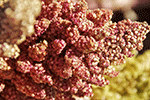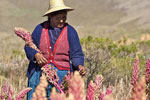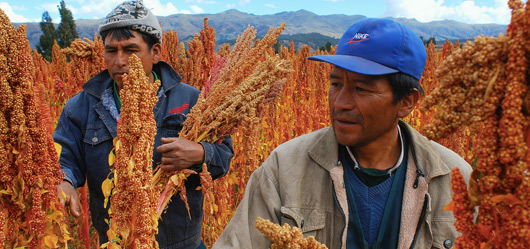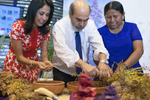Latest

Information Platform on Quinoa

Article: Slow Food and FAO launch “Quinoa in the Kitchen”
Video: Interview with Nadine Heredia, First Lady of Peru (in Spanish)
FAO's role in quinoa
Like the potato, quinoa was one of the main foods of the Andean peoples before the Incas. Traditionally, the quinoa grain is roasted and then made to flour to make different types of breads.
It can also be added to soups, used as a cereal, made into pasta and even fermented to beer or chicha, the traditional drink of the Andes. When cooked it takes on a nut-like flavor.
Climate change
Quinoa is recognized not only for its nutritional and dietary properties but also for its genetic diversity, adaptability to different agro-environmental conditions as well as the cultural and socio-economic benefits it has on the local environment.
Faced with the challenge of increasing the production of quality food to feed the world's population in the context of climate change, quinoa offers an alternative for those countries suffering from food insecurity.
It also, has the potential to reduce dependence on other staples like wheat and rice.
Growing quinoa
Quinoa can be found natively in all countries of the Andean region, from Colombia to Argentina to the south of Chile with almost all production in the hands of small farmers and associations.
FAOSTAT reports that, in the period 1992–2010, the cultivated area and total production of quinoa in the main producer countries of Bolivia, Peru and Ecuador almost doubled and tripled respectively.
In 2009, production in the Andean region amounted to approximately 70,000 tonnes.
Quinoa cultivation is spreading and now occurs in more than 70 countries, including France, England, Sweden, Denmark, Holland and Italy. It is also being developed successfully in Kenya, India and the United States.
Faced with the challenge of increasing the production of quality food to feed the world's population in the context of climate change, quinoa offers an alternative for those countries suffering from food insecurity.
FAO and quinoa
The United Nations General Assembly declared 2013 as the 'International Year of Quinoa', in recognition of ancestral practices of the Andean people, who have managed to preserve quinoa in its natural state as food for both present and future generations.
The sustainable production of neglected crops can help in the challenges faced by the modern world, calling on the accumulated knowledge of our ancestors and the small family farmers who currently are the major producers of the crop.
The promotion of quinoa is part of a broader FAO strategy to encourage the cultivation of traditional or forgotten crops as a means of contributing to food security.
As the implementing agency for the International Year of Quinoa, FAO coordinated a wide variety of events and the result of this activity is a new generation of projects promoting quinoa around the world.




